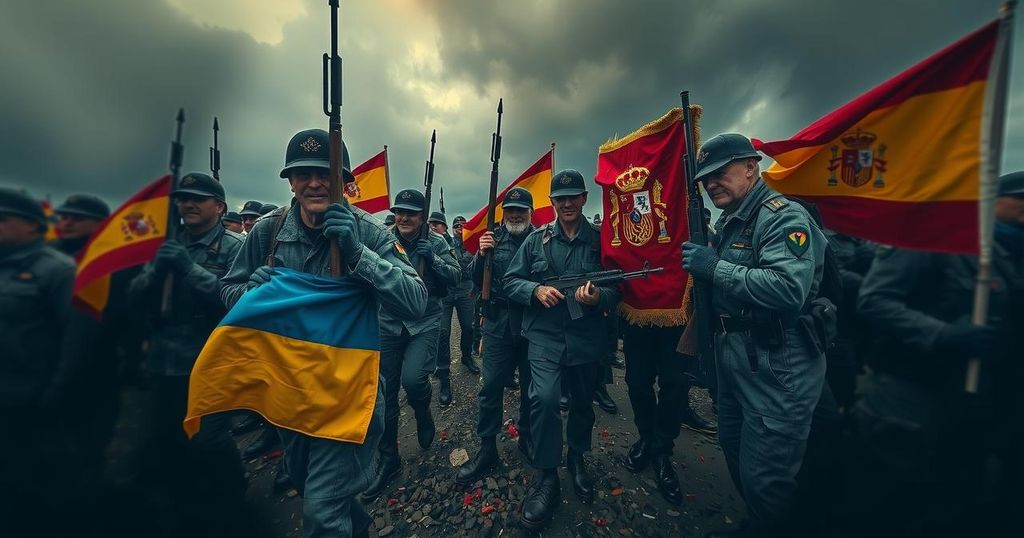Why Ukraine Represents a Contemporary Spanish Civil War
As the Ukraine conflict approaches its second anniversary, it reflects a crucial historical moment akin to the Spanish Civil War. Despite apparent differences, lessons from the past underscore the urgency of supporting Ukraine today. The war not only embodies the struggle against Russian aggression but also poses a threat to international order, necessitating a decisive response to prevent the ascendancy of authoritarianism globally.
As we observe the unfolding second year of the Ukraine conflict, it becomes evident that this war serves as a pivotal moment in history, reminiscent of the Spanish Civil War of the 20th century. Although the two conflicts possess distinct characteristics, there are critical lessons to be learned from the past, which compel us to intensify our support for Ukraine amidst a backdrop of escalating violence and rhetoric. The uncanny parallels between the two wars raise significant concerns about failing to grasp the implications of allowing authoritarian forces to prevail. The Spanish Civil War saw the emergence of ultraconservative factions rebelling against a Republican regime, symbolizing a wider ideological struggle. Conversely, the Ukraine war is not merely a civil conflict, as Moscow has attempted to portray, but rather a clear assertion of Ukrainian identity against an aggressive, imperialistic Russia. Unlike the divided support for the Republican forces in Spain, Ukraine enjoys a unified backing from Western nations, signaling a departure from historical precedents. In ideological terms, the Spanish conflict mobilized a spectrum of international support against fascism, which contrasts starkly with the current ambivalence towards the war in Ukraine. The ongoing conflict is viewed as a critical test for the international order, one wherein vanquishing Russian aggression is vital to thwarting further global destabilization. The situation is exacerbated by intensifying conflicts in other regions, such as the escalating violence in the Middle East, which seems to divert attention away from Ukraine. This misperception serves as a dangerous distraction while the stakes of the Ukraine war extend beyond mere territorial disputes; they embody larger issues of law, power, and human rights on a global scale. Despite the comparison of Putin to historic figures like Hitler, it is crucial to recognize the different contexts. Nevertheless, the potential for a modern Munich-like failure looms if the West falters in supporting Ukraine. The contemplation of European autonomy in the face of potential American isolationism reveals the importance of vigilance and commitment from European nations towards Kyiv’s defense. Current geopolitical dynamics demand a resolute stand against the encroachment of authoritarianism. History has repeatedly illuminated the necessity of timely intervention, illustrated through the lens of the past. The Ukraine war not only represents a battle for its sovereignty and democracy but serves as a cautionary emblem for our collective future. The consequences of negligence in this matter could reverberate globally, necessitating a unified front against aggression before it escalates further.
Understanding the contemporary war in Ukraine necessitates a historical perspective, particularly referencing the Spanish Civil War. The Spanish conflict, which occurred between 1936 and 1939, involved a fierce battle between Republican forces and Franco’s nationalists, backed by Nazi Germany and fascist Italy, while the Republicans received limited support from the Soviet Union. This historical conflict serves as a backdrop against which comparisons can be drawn to the current war in Ukraine, a struggle not for political dominance but for national sovereignty against Russian aggression. The parallels lie in the dire importance of international response and the dangers posed by appeasement.
In conclusion, the war in Ukraine stands not merely as a regional conflict but as a defining moment that echoes the lessons of history, particularly the Spanish Civil War. The West must maintain its support for Ukraine to prevent a decline into authoritarianism that could threaten global stability. Furthermore, recognizing the geopolitical implications is critical for ensuring peace and security. A failure to engage effectively could lead to a dark chapter in history, reinforcing the necessity for a robust and unwavering commitment to defending democracy and international law.
Original Source: worldcrunch.com








Post Comment